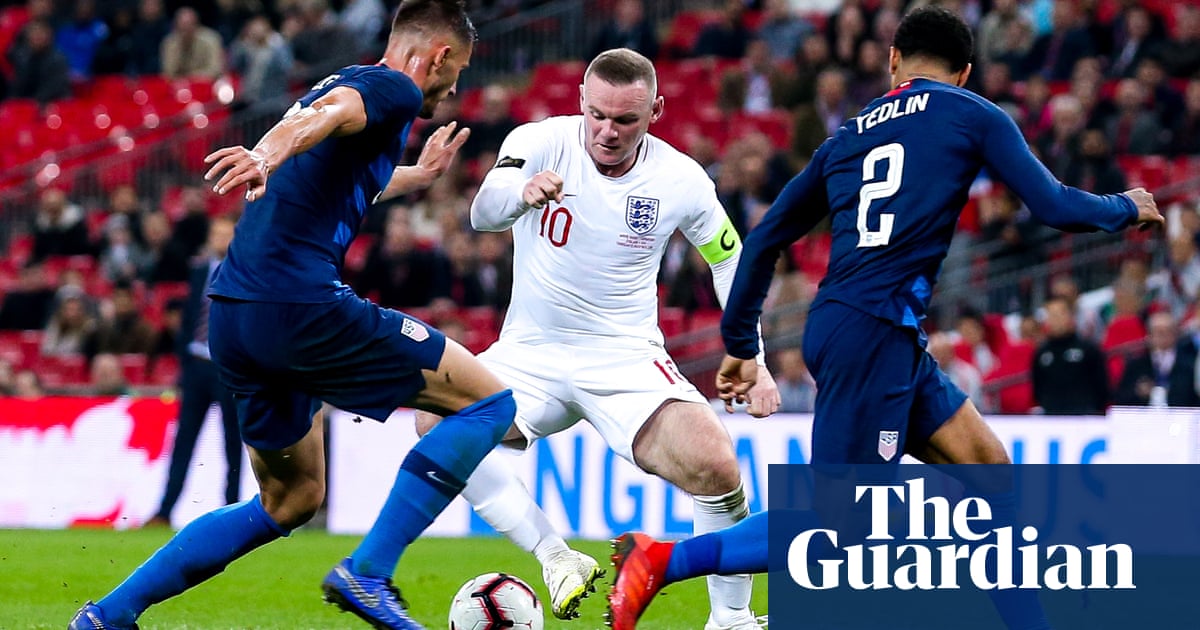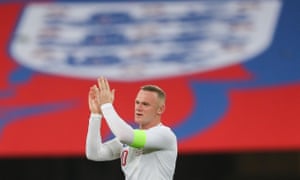
[ad_1]
In the end Wayne Rooney got the biggest cheer of the night. Which was, after all, the whole point. With 58 minutes gone there was a roar from the bleachers that almost became a full standing ovation as the crowd rose to clap and gawp, sucking the sweetness from the last of those big Rooney moments.
He looked pretty much the same, just a little stiffer in this light and speedy England team. Rooney’s first act was to watch DeAndre Yedlin skim past him on the outside. He leaped for a couple of headers. A bit later a man in a red shirt ran on to the pitch and threw an arm around his shoulder before being led away by stewards, but nobody really seemed to mind much.
Wayne redux was a fond, fun, slightly odd kind of thing. For long periods a basking, restless stadium felt more like a giant-scale village fete than a glossily staged international sporting event. Before kick-off, Wayne had appeared carrying one of his children and flanked by the other three. There was a restrained guard of honour. Rooney was presented with a shield, while just in front of him assorted military personnel perched on one knee, a little weirdly.
Yes, this was a marketing stunt designed to make money. But then, professional football is a marketing stunt designed to make money. This is what we’re doing here, retailing entertainment. If enough people are willing to pay to see Ashley Cole dress up in a Beefeater’s outfit and juggle a bowl of rice pudding with his left foot then the FA could probably find a way to make that happen as well.
It worked too. Wembley was two-thirds full. At times like these the PA becomes a huge, deafening echoey thing, rattling around those steeply banked empty plastic seats. In a way it felt quite apt. The Rooney era spanned the age of the deadening Wembley night, of crowds that come in late and leave for the early tube, of mooching, one-paced England teams enlivened only by a brief moment of Wazza.

As England kicked off, it was as though Gareth Southgate had decided to stage his own quietly phrased rebuttal of that recent past. He fielded another mobile, fluid super-youthful team. Seven of the starting XI were 25 or under and they were impressive in patches against a young, brittle, occasionally sparky USA.
It was Jadon Sancho who got the banks of schoolkids on their feet in the opening exchanges. One lovely little no-look shimmy that left his man facing the wrong way drew approving gasps from the youthful cognoscenti. Evidence here of sick skills on the biggest stage.
England’s two first-half goals were also a hymn to the new age sparked most decisively by Rooney’s own long-overdue dropping two years ago. First, Jesse Lingard provided a reprise of his goal against Panama, curling the ball beautifully over Brad Guzan. Then Sancho made one for Trent Alexander-Arnold with a cute pass, finished hard and low into the corner.
Throughout that period, England provided a fine advert for the benefits of moving the old guard along, for investing in youth and unscarred potential. Sancho was the real star turn, playing with his head up, moving intelligently from wing to wing, able to take the ball on the move and spring into space.
There are comparisons with Rooney to be made, albeit Rooney at the same age was a genuine phenomenon. Aged 18, he was already the best Rooney, an attacking footballer with a fearsome cutting edge. Sancho isn’t that yet, but he has the same kind of joy and brio, the same sense of ownership of the spectacle, challenging everyone else on the pitch to look quite this good with a football at his feet. He has the same street footballer smarts too, a kid from Kennington who now has it all spread out in front of him, the full range of triumph and trauma to come.
But then Sancho – so smart, so clued up – is also a reminder of just how much the culture around these players has changed, how gauche and pink and newborn Rooney still looked at the same age. Rooney’s was a journey without maps, the mature Premier League’s first teenage-superstar, barrelling around in that baggy white England kit like a pasty-faced pitch-invader.
Things have become more orderly for those that have followed, coping structures devised for the glare, the money, the distractions. Learn from Wayne, young England starlets. In more ways than one.
Callum Wilson scored England’s third late on. For a while England seemed to be trying to tee Rooney up for a clear shot at goal that never quite came.
At the end there were hugs and chest bumps and as the stadium emptied a few last rounds of “Ladeeez and gentlemen, one last tiiiiiime … WAAAYNE ROONEY”. Was it necessary to do all this? No. Is it worth getting upset about? No. Was it a bit weird? Yes. But the Rooney farewell seemed fair enough, a great England player with enough fondness among the crowd to make it a fun, warm occasion. Best of all, Wayne: The Return was a sign of just how far England have moved on.
Source link